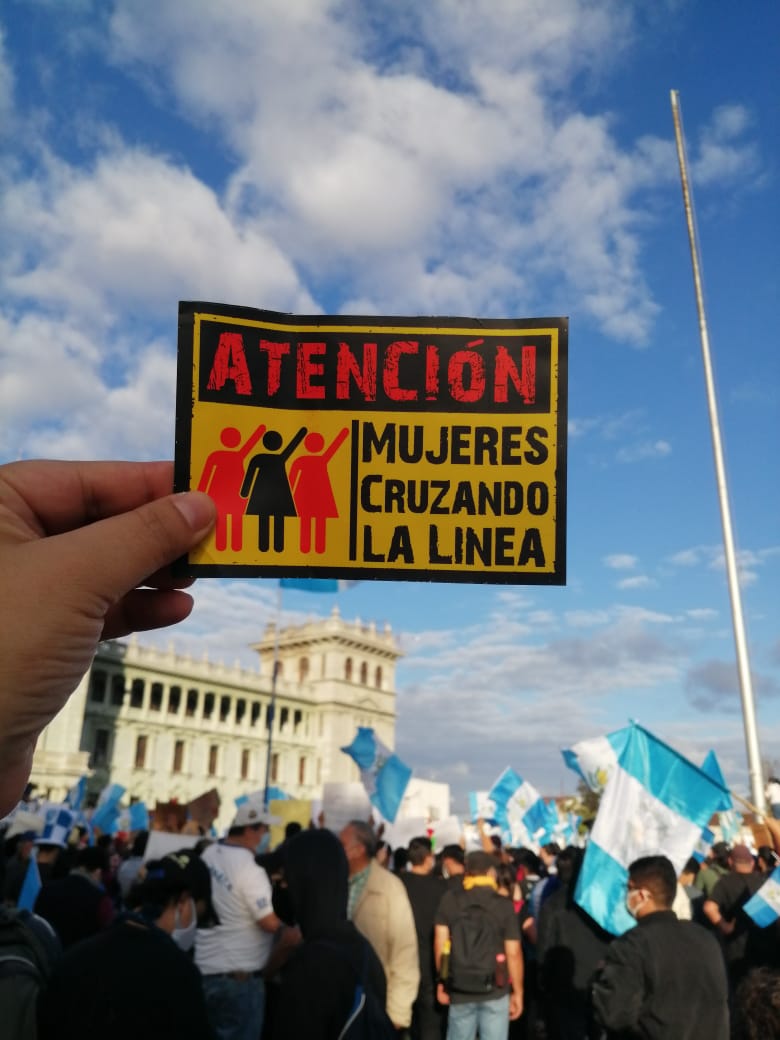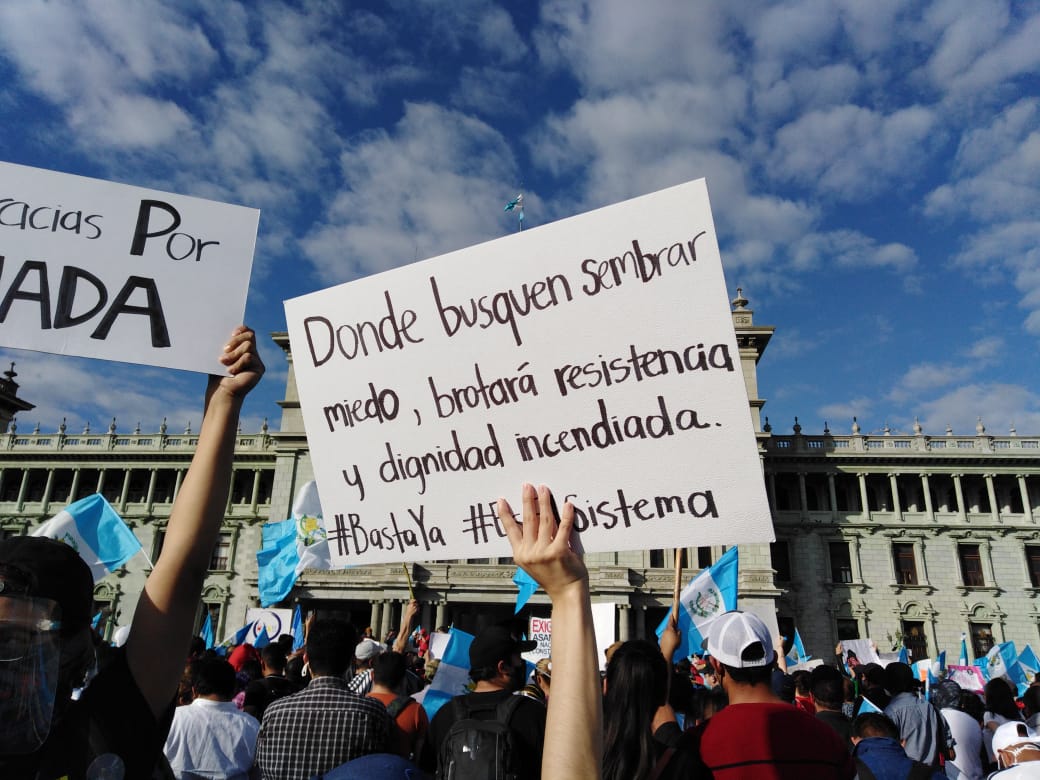



The country was still reeling from the impact of hurricanes Eta and Iota when a new crisis hit Guatemala last week, this one the product of a history of accumulating pressure in the country. The political crisis revealed public outrage of broad sectors at government corruption and impunity, particularly aimed at the Guatemalan Congress.
The peaceful demonstrations of thousands of people across the country on Saturday, Nov. 28 began without incidents. Following national and international criticisms of the violent police crackdown a week ago, in the morning the minister of Government announced that the administration would guarantee public safety during the protests. His statements represented a major departure from the brutal repression up to then and reflected the impact of public pressure calling for his removal from office.
During the past week and then again at the large demonstrations on Nov. 28, the presence and leadership of youth and women stood out. In plazas in nearly all major cities, they called for the resignation of the president and his ministers, and for the Congressional leadership to step down, among other demands.
However, later in the day trouble broke out. According to denouncements, videos and photographs taken on the spot, at 17:15 in the afternoon a small group set fire to a bus in front of the National Palace, as the National Civil Police stood by. The protesters managed to control the situation, but the same group went on to attack several representatives of human rights groups and others.
A communiqué of the Convergence for Human Rights, a coalition made up of numerous Guatemalan civil society organizations, stated: “The Convergence for Human Rights repudiates the provocations carried out to delegitimize the right to assembly and peaceful demonstration. We also express our solidarity with the individuals attacked by the group of infiltrated provocateurs. We identify those behind these actions as the Minister of Government Gendri Reyes, the Vice Minister of Security Carlos Franco Urzúa, the General Director General of the PNC José Antonio Tzubán, the PNC Adjunct General Sub Director Edwin Adriano, and above all, PresidentAlejandro Giammattei.”
 On Wednesday, Nov. 18, the Congress of the Republic met in a plenary session during the night and approved a budget to send up for ratification by the Executive. The national budget reduced funds for social programs, particularly to combat malnutrition, and increased funds for the deputies themselves. Several of the promoters of the budget have long records of corruption, including lawsuits pending against them within congress, courts and other state agencies as a result of what has been called “the Pact of the Corrupt.”
On Wednesday, Nov. 18, the Congress of the Republic met in a plenary session during the night and approved a budget to send up for ratification by the Executive. The national budget reduced funds for social programs, particularly to combat malnutrition, and increased funds for the deputies themselves. Several of the promoters of the budget have long records of corruption, including lawsuits pending against them within congress, courts and other state agencies as a result of what has been called “the Pact of the Corrupt.”
News of the budget leaked to the press and provoked the indignation and anger of many sectors of the country. Gradually, different sectors spoke out, including the Coordinating Commitee of Agricultural, Commercial, Industrial and Financial Associations (CACIF, by its Spanish initials), the country’s most powerful business association. They called for a demonstration on Saturday in public squares throughout the country, including the Guatemala City’s Central Plaza. Women and young people took the lead in the call to denounce the move and demand the resignation of the president and the deputies who approved the budget.
On Nov. 21, crowds gathered in the central plaza of Guatemala City and in other departments, including Alta Verapaz, Quetzaltenango, Sacatepéquez, Huehuetenango and others. The large and peaceful demonstration downtown, in which most participants were wearing protective masks, was quickly surrounded by elements of the national civilian police. Nearby, in front of the Congress of the Republic, a group of protesters gathered and at one point some young men climbed on the windows and broke the glass and a fire was started in the front section of the Congress building.
Many videos and photographs show that the doors of the congress were opened from the inside, and that occupants were already standing ready with fire extinguishers at the door. They also demonstrate that the police force surrounding the building did not move at the time to prevent damage to the building. In addition, the Minister of the Interior later admitted that 40 members of the National Police were inside the building prepared for any eventuality.
The Public Ministry is currently investigating the event, but meanwhile more and more evidence has accumulated that indicates that individuals who had infiltrated the demonstration encouraged the action to justify the use of force that took place subsequently. Hours earlier, a similar incident took place in front of the Guatemalan municipal building where several young people set fire to the monument of Alvaro Arzú, a former president who at the time of his death by natural causes approximately two years ago was also under investigation for corruption during his term as mayor of the capital city.
The police forces reacted with brutal repression. They fired tear gas at the protesters, beat people with batons and chased journalists and others who were documenting events. Two young men lost an eye due to the impact of tear gas canisters. Several women were beaten and dragged away by the police and more than 40 people (mostly young people and women) were arrested. At present, only one is still in prison, according to the explanation because he changed lawyers and his case is still being processed. Demonstrations denouncing the repression, publication of further graphic evidence and on-going mobilizations of various sectors continue.
Hours before these events, Vice President Guillermo Castillo, a businessman with a reputation for being a moderate, gave a press conference where he informed the pubic that he had asked the president that they both resign for the sake of the country’s stability. His decision to distance himself from the president is not new—he has denounced the president’s lack of willingness to attack corruption. Giammattei essentially removed the vice president from his duties by creating a Government Office that in practice leads the cabinet and is presided over by a person said to be the president’s partner.
It is possible that if the president resigns, a consensus could emerge among the business sector to support Castillo to succeed Giammattei, who might no longer represent the interests and the stability that the business community needs. It may be difficult to revert the budget proposal though. Any move in this sense could face legal problems since only a vote of the full congress can approve a budget.
The opposition deputies in Congress have called for the resignation of the congressional leadership board and the president has summoned “various sectors” of the country to discuss the budget proposal. Some of the invitees have refused to participate. Indigenous peoples who comprise at least half the population, have not been summoned, and the ancestral authorities and other organizations have demonstrated in front of the palace during these days to express their discontent. Women and feminists from different s organizations are also demonstrating actively alongside youth throughout the country.
Just when most people thought that the situation couldn’t be worse, the few democratic spaces left open in the country have come under renewed attack, with repeated attempts to break with the already weak institutional framework of the State. In the context of the crises, the government has failed to respond to a population that faces ever greater poverty and vulnerability. The absence of the State in rural areas became glaringly clear with the pandemic and with the lack of an articulated response to help the population after the devastation of the hurricanes. To date, many communities continue to be completely cut off due to flooding, loss of communication and infrastructure. Their plight is exacerbated by crop failure, the harsh impacts of which will be felt over time.
Many differing proposals have emerged from the population and organized civil society, some that point to more radical structural changes and others to immediate actions that contribute to changes in a longer-term process. Those that seem to have the most consensus among organizations and public opinion so far are:
1. The resignation of the president
2. The resignation of the Minister of the Interior and the Director of the National Civil Police
3. Punishment of those responsible for the repression and respect for freedom of expression
4. The veto of the budget proposal
Public demonstrations are expected to continue in the following days, called by a growing number of sectors and citizen groups.